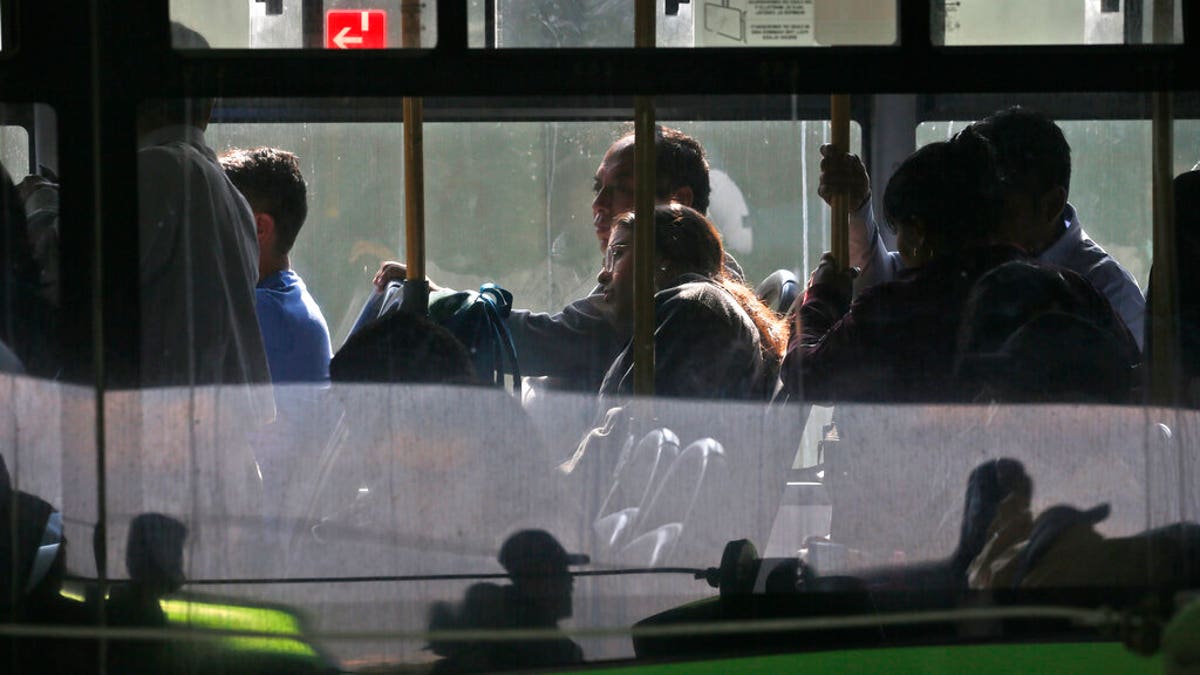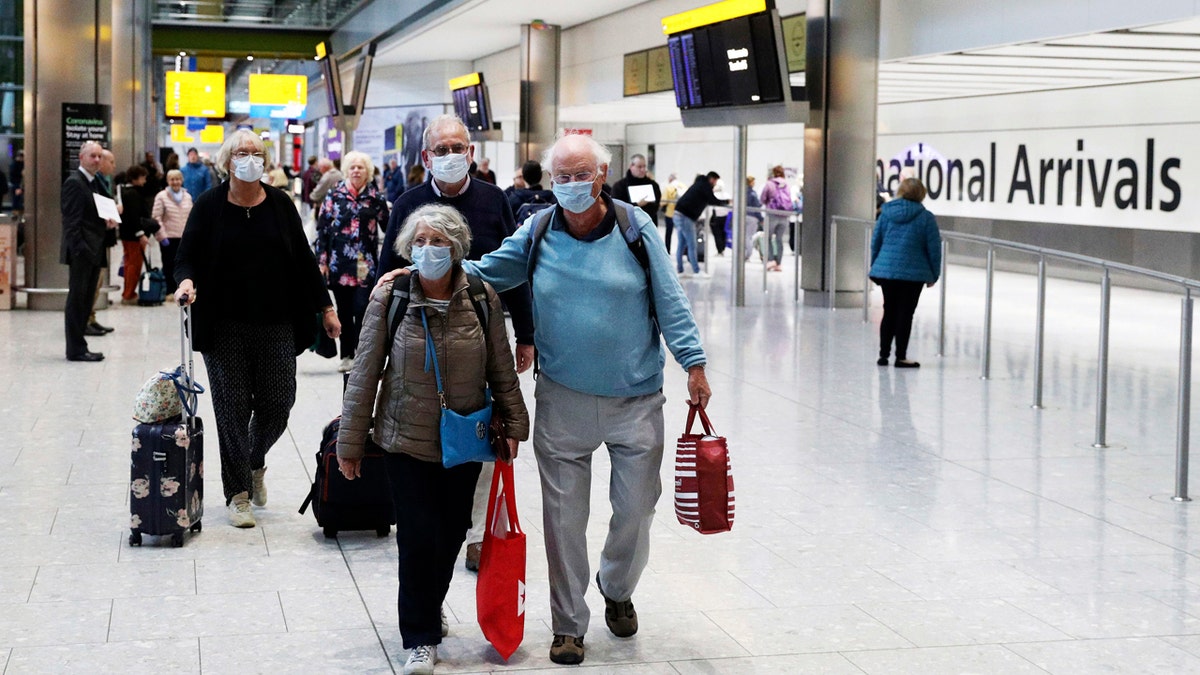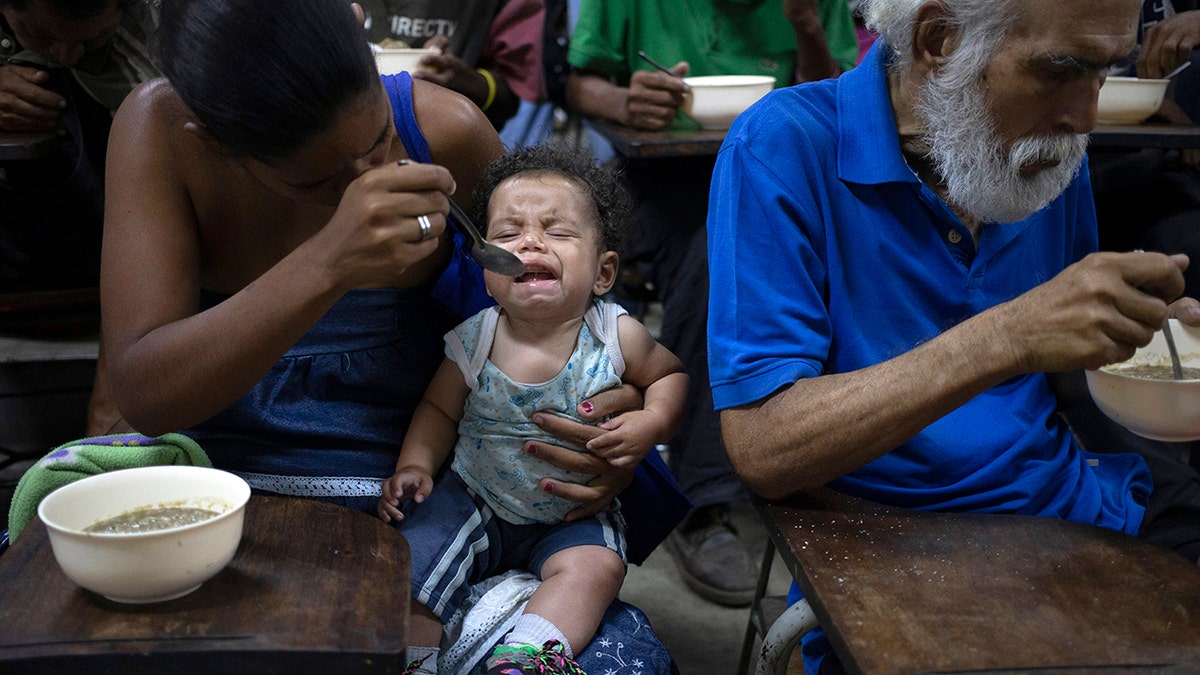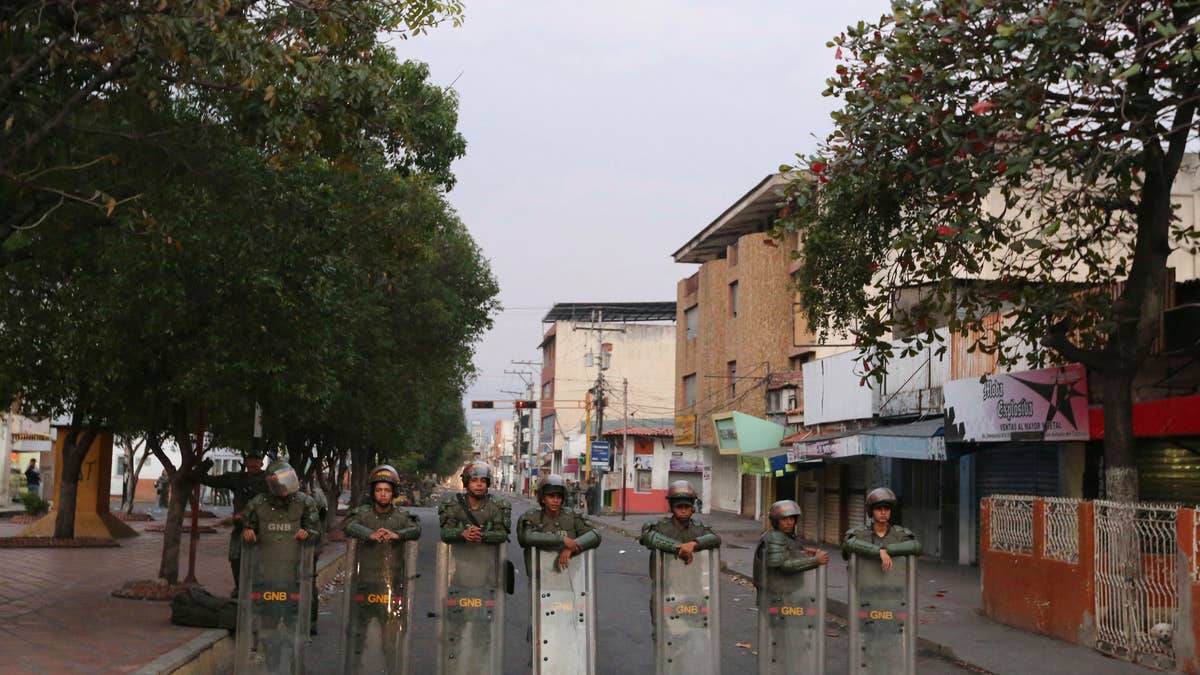New study details lifespan of coronavirus in air, on surfaces
A new government study is shedding more light on the properties of COVID-19; William La Jeunesse has the details.
Get all the latest news on coronavirus and more delivered daily to your inbox. Sign up here.
For years, Venezuela has been deemed one of the world's worst humanitarian crises.
But now, as the coronavirus pandemic seeps into its already dire fabric, many inside fear the worst is yet to come.
"We are in great danger with the coronavirus. We have a high malnutrition rate due to lack of basic necessities, already most people – including children – only eat one meal a day," one 38-year-old Venezuelan male, who requested only to be identified as Jesus for concern of reprisal, told Fox News. "There is a lack of medicines, doctors, face masks, and already an extremely high crime rate."
The embattled government of President Nicolas Maduro, which for more than a year has not been recognized by the U.S. and dozens of allied countries but still holds court in Caracas, on Monday ordered a national quarantine as infection rates multiplied.
On Tuesday, Maduro took the unprecedented step of asking the International Monetary Fund (IMF) for a $5 billion loan to help them fight the virus – the first time he has ever made such a request throughout his tenure – but was denied on the grounds the fund does not acknowledge his legitimacy.

Passengers sit on a bus at the main bus station in Guatemala City, Friday, March 13, 2020. Authorities in Guatemala, Uruguay and Venezuela confirmed their first cases of the new coronavirus on Friday, while Argentina announced its second death linked to the global pandemic, and some countries such as El Salvador and Ecuador reinforced measures to contain the spread of the virus. For most people, the new coronavirus causes only mild or moderate symptoms. For some it can cause more severe illness. (AP Photo/Moises Castillo)
By Thursday morning, the government had documented 36 infections but no deaths. However, many trapped inside fear it is hardly a true reflection of the grim situation.
Most crucially, the country – which remains awash with oil reserves and was once the wealthiest in Latin America – has long been grappling with an almost entirely depleted medical system. A survey by local NGO Medicos Unidos noted this week that 3 out of 4 hospitals reported that that they don't even have running water.
"The real issue is the state of the health care system, which is in serious trouble and lacks much basic medical equipment and supplies," said Eric Lorber, the senior director of the Center on Economic and Financial Power at the Foundation for Defense of Democracies (FDD). "It will not take much to overwhelm the health care system, which is probably why the government moved so quickly to lock down everything. The big fear is that if there is even a mile spread, it will overwhelm the country."
Furthermore, coronavirus – officially called COVID-19 -- checks have been "centralized" to the capital of Caracas under a singular government testing facility, rather than exporting tests to areas with suspected cases, which scores fear is a further recipe for disaster.

Passengers from the coronavirus hit Braemar cruise ship return to Heathrow Airport in London, Thursday March 19, 2020. (Steve Parsons/PA via AP)
One Caracas-based authority who requested anonymity told Fox News that the relativity low number of cases thus far simply comes down to the notion that they have next to no testing kits, and usually only around 30 people are being tested daily.
"Some of the calculations are upwards of eight times or 10 times the numbers announced by the government. The biggest problem now is running water; most of the country does not have it," the source continued. "This makes it hard to follow the protocols of washing hands and cleaning exposed surfaces."
What's worse, many stressed is that the already dilapidated hospitals also lack the means for basic sanitary and intensive-care conditions.
"Health personnel in Venezuela are often prohibited from talking about the coronavirus, but many of them know there is no way to protect themselves from this virus. They don't have money for masks and even less money to buy soap," said Ephraim Mattos, executive director of the Stronghold Rescue & Relief Foundation, which is purporting to support the hardest hit Venezuelans in crisis. "And now, due to the mandatory quarantine, people cannot work to support themselves. There are great shortages in food and medicines, even in the stores that once had supplies, due largely to nervous buying."
Javier Vanegas, a Venezuelan English teacher now exiled in Ecuador, said that several doctors inside the embattled nation are now started to speak out – under the cloak of secrecy – that the number of apparent cases is significantly higher than official figures. Many also worry that the "medicines" used to treat ill patients may prove to be worse than the disease itself.
"Most Venezuelan citizens will not be able to do much more than improvise face masks," Vanegas said. "Which has already been discarded as an effective method to prevent the infection."
However, frontline health care workers are resorting to whatever they can do that may offer even a glimmer of hope.

Zoraida Silva, 26, feeds her six month baby Jhon Angel, at a soup kitchen in The Cemetery slum, in Caracas, Venezuela. Silva said that she can not afford to have 3 meals a day, and she has been eating at the soup kitchen for two years ago. According to a survey recently published by the U.N. World Food Program, one of every three Venezuelans cope with food insecurity, unable to get enough food to meet their basic dietary needs. (AP)
Luisa Diaz, the 1999 Miss Venezuela-turned-author and founder of the charity Mi Amor Gala for survivors of domestic violence, highlighted that desperate doctors and nurses have resorted to sewing their own homemade masks.
"There is no soap, no water. The policemen are telling people they cannot go outside without a mask, yet there are no masks," she said. "Venezuela does not have the capacity to respond to this pandemic."
Fox News conducted interviews with more than a dozen individuals across the country, who all painted a picture of grave concern for the decimated health care system and what lies ahead of them as panic sets in.
"The virus is already here," one Caracas-based worker, Gabriel, said. "The hospitals are in very bad condition; we are all very worried. We don't know what to do."
Dr. Guillermo Veita, President of the Venezuelan Society of Gastroenterology, spoke of extreme laboratory and pharmaceutical costs, and the grave risks to health care workers who can barely find latex gloves.
And Heysel Rodriguez, a consultant and strategic planner in Caracas said that while Maduro has promised the people "social compensation" and to "speed up the delivery of CLAP boxes" – the rationed food supplies given to families under the socialism model – there is little in the way of protein, leaving much of the nation of some 30 million malnourished and hardly in a position to contend with the looming contagion.
The disease also threatens the fragile political turmoil that has beleaguered the country for almost six years. Data provided to the United States from the Armed Conflict Location & Event Data Project (ACLED) showed that since the beginning of March, there have been at least five protests with regards to the government's handling of the coronavirus outbreak.

Venezuelan Bolivarian National Guards lineup to block the main entrance of Simon Bolivar bridge to San Antonio after being closed by Venezuelan Bolivarian National Guards officers in San Antonio, Venezuela, Saturday, Feb. 23, 2019. Venezuelans frustrated over their nation's crippling food and medical shortages are expected to join opposition leaders Saturday in a potentially risky push to deliver international aid that Nicolas Maduro has refused to accept into the country. (AP Photo/Fernando Llano)
Indeed, some activists concurred that the government is also using the pandemic as an excuse to strengthen its authoritarian rule by effectively making the police and armed forces in charge of forcing individuals into lockdown in some areas.
"Now, there are no flights in or out of Venezuela, and people are (attacked) by security forces if they are out after 6 p.m., and are made to go home unless they can prove they are looking for medical supplies, are a doctor, or are a member of the security forces," one Caracas-based journalist explained.
However, Guillermo Aveledo, a political science professor at the University of Caracas, also underscored those underlying political grievances with Maduro by much of the Venezuelan population may also fuel the virus' spread.
"This is a surreal situation because mistrust in Maduro's government has led many people to ignore or dismiss official warnings," he said. "Some people think the government is acting on overkill, trying to further encroach on their civil liberties and put everyone under strict quarantine."
In addition, Aveledo emphasized, many of the elderly are frail and have had to stay behind in Venezuela as their healthier relatives have gone abroad in order to make money to send home, leaving scores without proper care or supervision.
IN VENEZUELAN CRISIS, FAMILIES CAN'T EVEN AFFORD TO PROPERLY BURY THE DEAD
Yet, some remained optimistic, reciting the reports that they would be receiving an influx of assistance from China and Cuba, but others contended that remains to be seen.
"The campaign from Maduro is trying to make everyone believe that the coronavirus is a U.S. biological weapon used to attack China. The regime is also promoting a Cuban vaccine, but people think that is propaganda for delaying any action coming from abroad," said Miguel Marquez, a university teacher based in Caracas. "The situation is developing into social anxiety. Food production has almost entirely stopped, borders closed, and blackouts are still happening often."
And for the families of the five U.S. citizens and one permanent resident who are currently detained as political prisoners – termed the "CITGO 6" – under the intelligence wing called the SEBIN, they are now filled with a very new rash of unknowns.
"It is chaos. We are very worried because dad is in the high-risk population," lamented Veronica Vadell, whose 60-year-old father, Tomeu, one of those who have been held for over two years, suffers from a severe heart condition. "We are just hoping something happens soon, and Maduro releases them on a humanitarian basis. We are concerned they will just die if the virus hits."
As of Thursday morning, the novel virus had claimed the lives of more than 9,300 people globally. And most stuck inside the crumbling country that is Venezuela are merely just bracing for the situation to only worsen.
"Supplies and establishments have seen the amount of food diminished, which forces people to have to go outside almost daily. The electricity has been a failure, and education is paralyzed," added Dr. Saul Villamsil Bastidas, a bio analyst and Head of Chair in Biochemistry at the Central University of Venezuela. "Although the current situation here is no secret to anyone, humanitarian aid would be of great value at this time for our country."
